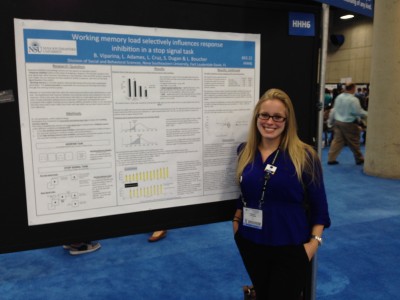NSU Newsroom
SharkBytes
Horizons
This version of NSU News has been archived as of February 28, 2019. To search through archived articles, visit nova.edu/search. To access the new version of NSU News, visit news.nova.edu.
This version of SharkBytes has been archived as of February 28, 2019. To search through archived articles, visit nova.edu/search. To access the new version of SharkBytes, visit sharkbytes.nova.edu.
Farquhar College of Arts and Sciences Students Present at Neuroscience Meeting in California
Four students from the Farquhar College of Arts and Sciences presented at the 43rd Annual Meeting of the Society for Neuroscience in San Diego, California, Nov. 9–13.
Katie Dabrowski, an Honors psychology major pursuing a behavioral neuroscience minor, presented her Divisional Honors Thesis research poster titled “The Effect of Physical and Mental Exercise on Executive Functioning.” The research examined the effect of brain-training games and/or physical exercise on the ability to inhibit one’s behavior on a cognitive task. Results show that after completing brain-training games, participants were better able to inhibit their behavior. In addition, those with lower body-fat percentages were also found to exhibit better inhibitory control. The results might provide information about creating cognitive-enhancement programs and about the relationship between physical fitness and cognition. Dabrowski worked under the guidance of faculty advisers Leanne Boucher, Ph.D., and Tobin Silver, Ph.D., assistant professors at the college. Dabrowski attended the conference with support from the Undergraduate Honors Program.
Christina Gobin, a student in the college’s M.S. Experimental Psychology program, presented her co-authored research poster titled “The Effect of Chronotype on Stress Response, Sustained Attention, and Emotional Memory.” The research examined how one’s chronotype (i.e. “morning” person or “night” person) may affect emotional and non-emotion processing as well as stress responsivity. The results support previous findings that evening chronotypes exhibit greater affective instability and greater perceived stress than morning chronotypes. Gobin worked under the guidance of faculty adviser Jaime Tartar, Ph.D., associate professor and coordinator of psychology research at the college, and collaborated with Johnathan Banks, Ph.D., assistant professor at the college, and Ana Fins, Ph.D., associate professor at NSU’s Center for Psychological Studies. She attended the conference with support from the President’s Faculty Research and Development Grant.
Mackenzie Rack-Wildner, a student in the college’s M.S. Experimental Psychology program, presented her co-authored research poster titled “Movement and Cognition.” The research examined the effect of physical activity on cognition, specifically inhibitory control. Results suggest that after physical activity, participants show improved performance on inhibition tasks compared with when they did not participate in any physical activity. Rack-Wildner worked under the guidance of Boucher and Silver, and attended the conference with support from a PanSGA Professional Development Grant.
Brandi Viparina, a student in the college’s M.S. Experimental Psychology program, presented her co-authored research poster titled “Working-Memory Load Selectively Influences Response Inhibition in a Stop-Signal Task.” Results of Viparina’s research found that when participants are tasked with remembering lots of information, they take longer to inhibit their responses. This suggests that working memory and inhibitory processes share a common resource. Viparina worked under the guidance of Boucher and alongside undergraduate research assistants Lauren Adames, Laurie Cruz, Katie Dabrowski, and Shannon Dugan. Viparina also attended the conference with support from a PanSGA Professional Development Grant.
